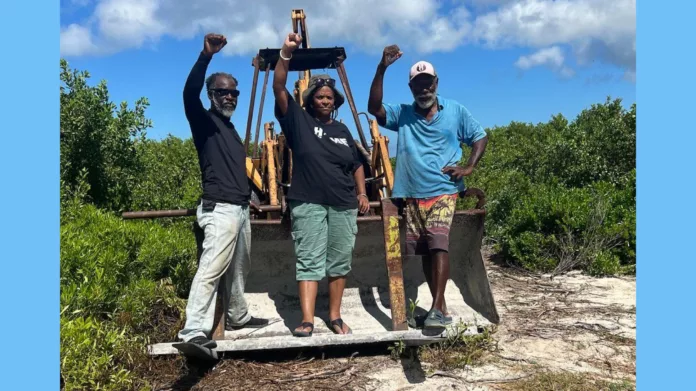
By Robert Andre Emmanuel
“Provisions [of the Physical Planning Act 2003] cannot be circumvented by pointing to a consultation at a village meeting about wider development proposals more than two years before work commences on site.”
That was just one of numerous excerpts from yesterday’s ruling by the Privy Council which chided the government for its failure to follow due process in the construction of Barbuda’s international airport.
John Mussington and Jacklyn Frank first brought the lawsuit in 2018, arguing that the controversial private jet airport would be ecologically destructive.
The government sought to have the case thrown out on the basis that Mussington and Frank were what they considered “busybodies” and did not have the legal standing to challenge the government’s decision.
However, the Privy Council, both when it heard arguments in November and in Tuesday’s judgement, ruled that the pair did indeed have legal standing to bring the lawsuit.
“Where… judicial review involves issues of environmental concern, it is not necessary that the applicant demonstrates an expertise in the subject matter.
“All that is required is that they demonstrate some knowledge or concern for the subject, so an amateur ornithologist or bird-watcher might raise a concern about the potential loss of a bird’s habitat; or a fisherman about the effect of a hydro-electric scheme on fish; or a local historian about the effect on an archaeological or historical site; or a local resident on the loss of a local beauty spot frequented by the local community,” the court ruled.
The court also said that because both Mussington and Frank live in Codrington, two kilometres from the airport, they will be affected by heavy air traffic, general disruption, and environmental damage.
Representatives for the non-profit Global Legal Action Network (GLAN), along with Mussington and Frank, held a debriefing on yesterday’s ruling, hailing it as “vindication” for the Barbudan people.
“Barbuda is worth fighting for, our self-determination is worth fighting for; they [the government] should have consulted Barbudans properly and I am relieved and happy that the judgement has gone in our favour—they have to listen to us now,” Frank expressed.
GLAN director Dr Gearóid Ó Cuinn also commented on the ruling, stating that it sends a firm message to developers who he said had acquired the rights to the lands on the back of Hurricane Irma.
“It is important to emphasise that a very particular form of development has been foisted upon them—one that benefits an elite and I think the airport is a gateway to understanding this problem… and we’re seeing the potential encirclement of an island and people and this is an affront to local self-determination, it is an affront to the rule of law, as has been exposed by this case,” Ó Cuinn said.
The ruling will not only have implications for other local cases including the PLH development at Palmetto Point but will also set a precedent in other Commonwealth nations for residents and environmental groups to challenge their governments.
“Development is something that has an impact on people and the environment – and the Development Control Authority and the Physical Planning Act are there to ensure that there is no harm put to people or the environment,” Mussington said.
During the legal proceedings, the government’s lawyer Dr David Dorsett sought to argue that even if Mussington and Frank had legal standing, the issue was moot because the airport was nearly complete.
Commenting on the Council’s judgement yesterday, Dr Dorsett said that the “ball is in the court of the Barbudans”.
“They have to decide in light of the reality that exists, which is that we have the airport… what further steps, if any, they will take in this matter.
“As far as we’re concerned, the airport has been done and the government is concerned about the economic and social development of the country… and an airport in Barbuda is important to that aspiration,” Dr Dorsett replied to Observer media.
However, UK attorney Leslie Thomas KC, who represented the appellants, said the team will now press ahead with challenging the government, by seeking to have a disclosure of information and demand the Environmental Impact Assessment (EIA) for the airport which they maintain they never received and have questioned whether one was ever carried out.
“What happens next? Well, for John, Jackie and the people of Barbuda, we are back in court…we say that this airport is being built illegally and where that potentially goes is, if we’re right, we’re gonna ask the government to tear down the airport—you do it properly because you haven’t done it properly in the first place,” Thomas said.
He added that the next steps also include a judicial review trial to be held in Antigua, while acknowledging that “the wheels of justice do not move particularly fast” in the country.
The Prime Minister’s Chief of Staff Lionel Hurst also responded to yesterday’s ruling, telling Observer that the Privy Council’s ruling means “busybodies can now sue government”.
